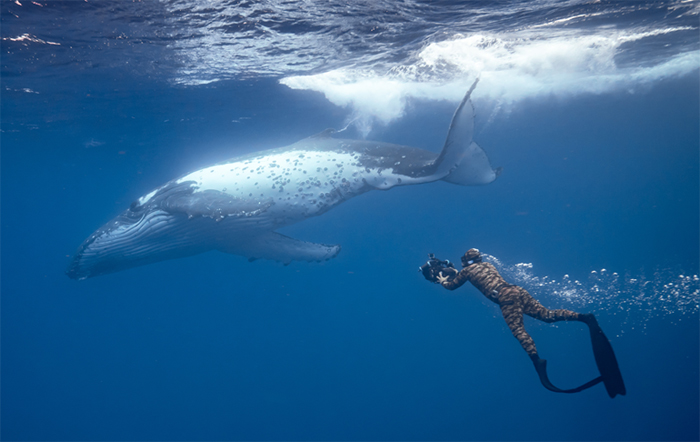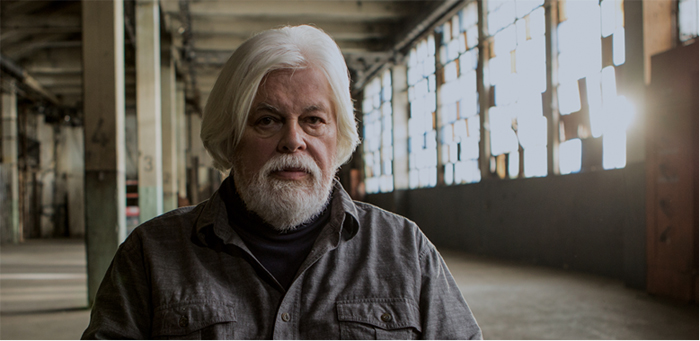|
|

|
  
Feature
Update 2020/11/5
Water Docs-Watson
CAPTAIN PAUL WATSON & THE SEA SHEPHERD MARINE WILDLIFE CONSERVATION SOCIETY FEATURED IN AWARD-WINNING FILM
By Suzanne Forcese
Whales fascinate humans because of their size, because of their social complexity, their intelligence. We know there s something there. They look at you. They look through you. They seem to be trying to question you. They see your heart beating. They see your lungs moving. They see the blood flowing through your veins because they re seeing with their ears. A picture of what you are .Who knows what a whale is thinking? I believe they are thinking.
And they know what we are capable of. Captain Paul Watson

Watson wins the WaterDocs Film Festival Water Warrior Award -- Photo Matt Calissi
In 1975 violent confrontations take place between Greenpeace and the Soviet whaling fleet. During the clash an injured sperm whale emerges. The dying animal makes eye contact with an activist and chooses to fall back rather than crush his small boat. The understanding and intelligence that the activist sees in the whale s eyes change his life forever.
His name is Paul Watson. On that day he vowed to dedicate his entire life to defending marine wildlife. Sea Shepherd was born and with it the heroic story of its ships and crew. Numerous vessels have contributed to buildingSea Shepherd s history throughout countless fights on every ocean in the world in the toughest waters always defending those who cannot defend themselves from those without mercy.

Captain Paul Watson s dedication to stopping illegal fishing activities anywhere in the world has earned him a reputation as a renegade activist and righteous warrior in defense of the oceans and its denizens. Photo Courtesy WaterDocs Film Festival - Photo Matt Calissi
Now approaching his seventieth birthday and stranded by legal issues, the Sea Shepherd founder recounts his remarkable journey in award-winning producer and director Lesley Chilcott s gripping new film Watson.
A rich voice and haunting eloquence move through the film s breath-taking underwater beauty juxtaposed with archival clips of dramatic heart-stopping encounters and shockingly brutal human actions. The voice is Captain Watson and WATERTODAY had the honour of speaking with the man behind a growing movement. The man who continues to intervene on behalf of my clients: the ocean creatures endangered by overfishing and illegal activities on the high seas.
In the film, Watson speaks openly about private and public issues. We learn about his time with Greenpeace and some of Sea Shepherd s highest profile actions in alarming footage that is not for the feint of heart.
Watson, who grew up in a fishing village in New Brunswick, had a view of the destructive nature of the fishing industry.
He tells us he became an activist at the age of 11. After spending a summer sharing a stream with a family of beavers and swimming with them daily, he was puzzled to find them missing the following summer. Learning that trappers had taken all the beavers during the winter, he walked the river banks the next year, releasing animals and destroying the traps.
At the age of 15, Watson ran away from an abusive father taking on a job as a deck hand. At 18, he became the youngest founding member of the Greenpeace Foundation, taking action against nuclear testing on Amchitka Island, seal hunting and other environmental issues.
At 26 he was dismissed from Greenpeace and established Sea Shepherd.
I couldn t keep watching animals get beaten and killed without intervening. You don t walk down the street and see a kitten being stomped or a woman being raped and do nothing. I set up Sea Shepherd to intervene against illegal activities that destroy marine wildlife.
That intervention has put his own life and the lives of his crew at risk.
I always ask my crew are you willing to risk your life for the life of a whale? People may think that s extreme but we ask young people all the time to risk their lives, and die for war over real estate, oil and religion. I think it s a far nobler pursuit to take a risk to protect an endangered species or endangered habitat.
Why are we killing whales? For the oil. To be used in weapons of mass destruction.
Watson says his approach to exposing illegal activities on the seas is, and has always been aggressive non-violence. In 42 years no one has died.
What about fear? Watson says I came close to death in my childhood. In that moment I surrendered to an acceptance. Since then I have not felt fear. Only purpose.
At the time of filming Watson, Watson was sought by the governments of Japan and Costa Rica in connection with his involvement in two separate interventions. While he is currently welcome in the United State,s there is an Interpol Red Notice out for his arrest. (The Costa Rican Red Notice was dropped with the new Costa Rican President taking office).
A Red Notice is usually used to alert local law enforcement around the world about wanted fugitives. Mass murderers, drug kingpins, war criminals. I m the only person in history to be put on the Interpol Red list for conspiracy to board a whaling ship. And I didn t even do it! But I thought about it.
In his philosophical acceptance of living in the moment and working with the raw material that life pitches, Watson talks openly to WT about the blessings that obstacles have brought him.
If I had not had an abusive father I would not have run away and begun a life on the sea. If I had not been kicked out of Greenpeace I would not have founded Sea Shepherd. If I were not in exile I would not have travelled to France where I met my wife. Had I not met her I would not have a four year old son who teaches me something every day.
There are no regrets either. I don t think I have made sacrifices. Nothing happened that I didn t anticipate. I think I have proven that each and every one of us has the ability to change the world. I tell everyone, including my 40-year-old daughter don t allow yourself to be deterred by criticism. Follow your passion, the virtues of courage and imagination to achieve what you need to do in a non-violent way.
Watson says his epiphany came in the 1970 s when he was a medic during the occupation of Wounded Knee by the American Indian Movement. There were 306 of us surrounded by 3000 federal troops. I asked Russell Mean, one of the leaders, why we were here when we don t have a chance. He said We re not here because we re concerned about the odds against us.
And we re not here because we re concerned about winning or losing. We re here because this is the right place to be, the right thing to do, and the right time to do it. You do what you can in the present and that contributes to whatever the future is going to be . And that has been my philosophy ever since.
In a way, Watson admits his continued exile has made him stronger. I don t need to be on the sea. I have 12 ships out there, 200 people crewing in 42 countries, and unique partnerships with various governments. We provide the ships, crew and resources. They give us the authority to arrest.
Watson premieres November 4, 2020, at the WaterDocs (virtual)Film Festival.
Watch the trailer
The ocean is the planet s life support system. Its crew includes everything from phytoplankton to the great whales. You can only destroy so much crew before the whole life-support system begins to collapse. Right now the oceans are dying. When the ocean dies, we die. -- Captain Paul Watson
suzanne.f@watertoday.ca
|
|
|
Have a question? Give us a call 613-501-0175
All rights reserved 2026 - WATERTODAY - This material may not be reproduced in whole or in part and may not be distributed,
publicly performed, proxy cached or otherwise used, except with express permission.
|
| |